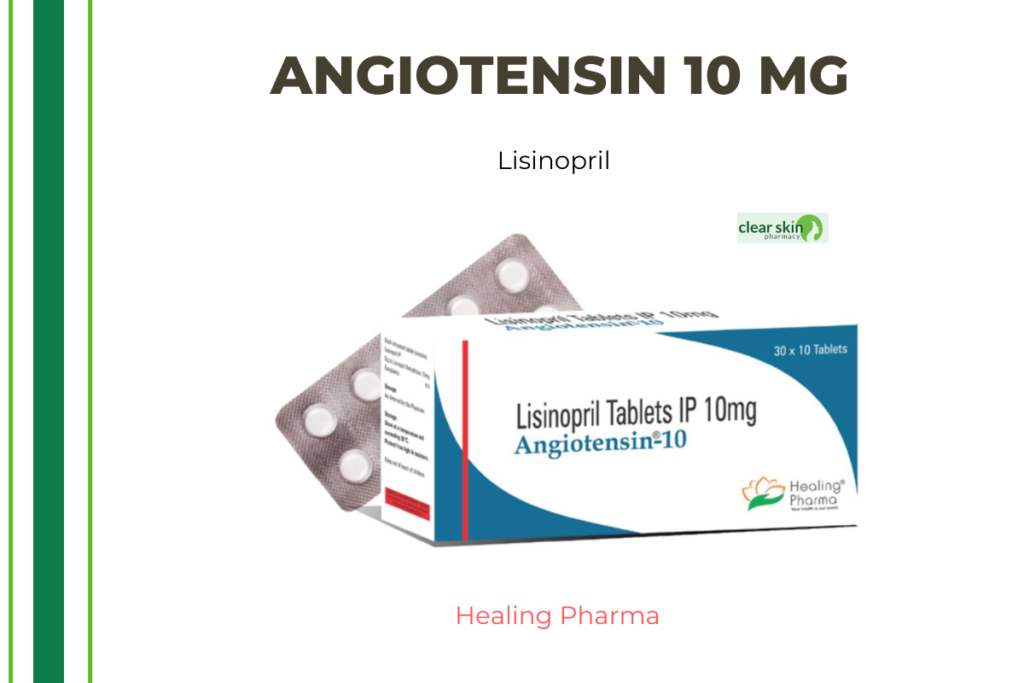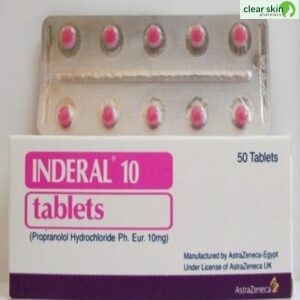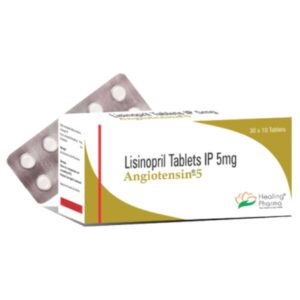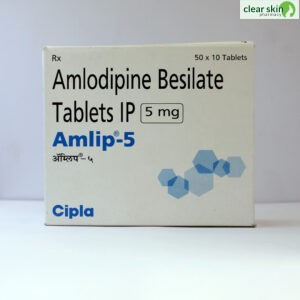Angiotensin 10
Angiotensin 10 is a blood pressure-lowering drug known as an Angiotensin-Converting Enzyme (ACE) Inhibitor. It is commonly used to treat high blood pressure (hypertension) and reduce the risk of heart attack, stroke, and heart failure. High blood pressure is a chronic condition in which the blood vessels are subjected to a great deal of pressure. Blood exerting a high pressure on the walls of blood vessels causes hypertension (arteries). Heart failure occurs when the heart cannot pump sufficient blood to fulfill the demands of the body. Blood flow obstruction to the heart muscle results in a heart attack or stroke. In most cases, a buildup of fat and cholesterol in the coronary artery causes the obstruction (supplies blood to the heart).
Lisinopril, which is included in Angiotensin 10, reduces the body’s production of substances that might elevate blood pressure. Angiotensin 10 relaxes and dilates blood vessels, easing the heart’s ability to pump blood to all regions of the body, decreasing blood pressure, and reducing the risk of heart failure, heart attack, and stroke.
You can take Angiotensin 10 with or without meals. The tablet should be consumed whole with a glass of water; it should not be chewed, crushed, or broken. Take Angiotensin 10 at the same time every day. In certain instances, you may experience typical side effects including headache, dizziness, tiredness, and cough. The majority of these side effects do not require medical intervention and will disappear with time. Consult your doctor if you have these side effects on a regular basis.
Continue taking Angiotensin 10 as advised by your doctor to successfully treat your problem. Stopping medication on your own might result in a sudden increase in blood pressure, chest discomfort, or even a heart attack. Regular monitoring of blood pressure, electrolyte levels, and renal function is needed when taking Angiotensin 10. It would be advantageous to have a low-sodium (sodium chloride) and low-fat diet when taking Angiotensin 10. If you are pregnant or nursing, you should not take Angiotensin 10. Consult with your physician; he or she may be able to provide an other drug. Children under the age of 18 should not take Angiotensin 10 since its effectiveness and safety have not been shown.
Angiotensin 10 is employed to treat hypertension (high blood pressure) and avoid heart attacks, strokes, and heart failure.

Medicinal Advantages
Angiotensin 10 relaxes and dilates blood vessels, helping the heart to pump blood to all areas of the body more efficiently. This helps reduce blood pressure as well as the risk of a heart attack or stroke. Angiotensin 10 decreases blood pressure in both the supine and prone positions without producing orthostatic symptoms (sudden decrease in blood pressure which might occur when a person stands up suddenly). When dehydrated, Angiotensin 10 may have an orthostatic impact. With sustained usage, Angiotensin 10 reduces the severity of heart failure, the rate of hospitalization, and symptoms such as weakness and shortness of breath. Angiotensin 10 is a blood pressure medicine that can be used alone or in combination with other drugs to treat hypertension.
Per the manufacturer’s directions, Angiotensin 10 can be taken with or without meals. The Angiotensin 10 pill should be swallowed whole with a full glass of water; it should not be crushed or chewed.
Place in a cool, dry area out of direct sunlight.
Angiotensin 10 Side Effects
Headache
Nausea
Dizziness
Weakness
Hypotension is a condition in which the blood pressure (low blood pressure)
Sinusitis is a common ailment that affects (inflammation of the sinus)
Breathing problems
stomach ache
Diarrhea
Indigestion
Chest pain and a rash on the skin
Muscle ache
Hyperkalemia is a condition in which the body’s (increased levels of potassium in the blood)
A chronic dry cough that won’t go away
Problems with the kidneys (shown in a blood test).
Drug Recommendations
Do not take Lisinopril if you are allergic to it or to any of its constituents. Consult a physician if you have heart, kidney, or liver issues. Lisinopril may cause an abnormal decrease in blood pressure, particularly in individuals who are dehydrated, using diuretics (medicines used to treat edema), or have low salt levels. Regularly monitor your blood pressure to avoid any potential problem. Avoid using Lisinopril during pregnancy and nursing. Consult with your physician; he or she may be able to provide an other drug. Lisinopril is not recommended for children under 18 since its effectiveness and safety have not been shown. Inform your doctor of all the drugs you’re taking and your current state of health in order to rule out any adverse effects. Consult your physician if you have lost a significant amount of bodily fluids owing to vomiting, diarrhea, or excessive sweating, or if you are using low water pills (diuretics) to treat edema, or if you have dialysis. Stop taking Lisinopril a day before to any surgical or dental treatment requiring anesthesia. Ensure your physician is aware that you are taking Lisinopril. Regular monitoring of blood pressure, electrolyte levels, and kidney function is essential when using Lisinopril.
Interactions Between Drugs
INTERACTIONS BETWEEN DRUGS: Heart failure medications (sacubitril, valsartan), nonsteroidal anti-inflammatory drugs (NSAIDs) (aspirin, naproxen, indomethacin, ibuprofen), erectile dysfunction medications (sildenafil), anti-gout medications (allopurinol), and anti-diabetic medications (sitagliptin, metformin, insulin glargine) may interact with lis rg
DRUG-FOOD INTERACTION: While using Lisinopril, consume a diet reduced in salt and fat. Avoid potassium-rich meals such as potassium-containing salt substitutes and over-the-counter potassium supplements. Avoid tobacco use and alcohol consumption.
Angioedema (swelling), congestive heart failure (heart problems), anti-hemodialysis, low blood pressure, hyperkalemia (high potassium levels in the body), liver diseases, and kidney dysfunction may interact with lisinopril.
Cautionary Note
ALCOHOL
Avoid consuming alcohol while taking Lisinopril to reduce the risk of unwanted side effects. If you consume alcohol, Lisinopril’s efficacy may be diminished. If you have any concerns, please consult a physician.
PREGNANCY
It is not recommended to take Lisinopril during pregnancy. If you have any concerns, please visit your physician; your physician will assess whether or not Lisinopril may be administered to pregnant women.
BREAST FEEDING
It is not recommended to take Lisinopril if you are nursing. If you have any concerns, please see your physician; your physician will assess if Lisinopril can be taken to nursing mothers.
DRIVING
If you have vertigo while taking lisinopril, do not operate a vehicle or heavy machinery.
LIVER
It is conceivable that you will require a dose adjustment. Lisinopril should be taken with care in patients with liver issues. If you have any concerns, please consult a physician.
KIDNEY
It is conceivable that you will require a dose adjustment. Lisinopril should be taken with care in people with renal issues. If you have any concerns, please consult a physician.
No habit formation
Advice on Diet and Lifestyle
While using Lisinopril, it is advised that you consume a diet reduced in salt and fat.
In addition to taking Lisinopril, frequent exercise is suggested.
Eat a diet rich in whole grains, vegetables, and fruits.
Avoid tobacco use and alcohol consumption.
Maintain a healthy weight with proper nutrition and frequent exercise.
Meditation, yoga, and massage are stress management strategies that can also be used to treat hypertension.
Recommendations
To prevent hypotension, monitor your blood pressure often (low blood pressure).
Because Lisinopril may cause dizziness, rise slowly from a supine or reclining position.
Inform your physician about your current health and medical problems, as well as any drugs you are taking.
Avoid potassium-rich foods, including bananas, broccoli, almonds, avocado, and potassium supplements.
Continue taking Lisinopril for as long as suggested by your doctor to properly treat your condition.
Stopping medication on your own might result in a sudden increase in blood pressure, chest discomfort, or even a heart attack.
During treatment with Lisinopril, your doctor may advise you to have frequent kidney function tests and potassium levels evaluated.
Additional Information : This item is non-refundable.
Glossary of Diseases and Conditions
High blood pressure (hypertension) is a condition characterized by unusually high pressure in the blood vessels. Blood putting higher pressure on the walls of blood arteries leads to hypertension. Systolic and diastolic blood pressure measurements are taken. Systolic pressure is the pressure in the arteries as the heart beats or pumps blood. Diastolic pressure refers to the pressure in the arteries between heartbeats. Blood pressure is measured in millimeters of mercury (mmHg) using a blood pressure monitor (sphygmomanometer). The ideal blood pressure is 120/80 mmHg. High blood pressure is characterized by headaches, dizziness, nosebleeds, vision anomalies, chest discomfort, weakness, and dyspnea (shortness of breath). In the vast majority of cases, however, there are no signs or symptoms of hypertension. Heart failure occurs when the heart cannot pump enough blood to the rest of the body. Blood flow obstruction to the heart muscle results in a heart attack or stroke. The accumulation of fat and cholesterol in coronary arteries is the most prevalent cause of occlusion. Symptoms include pain or tightness in the chest, neck, arms, or back, as well as weakness, dizziness, anxiety, and an irregular heartbeat.
FAQs
Lisinopril belongs to the class of medications known as Angiotensin Converting Enzyme (ACE) Inhibitors, which act by decreasing the body’s synthesis of substances that might increase blood pressure. Lisinopril relaxes and dilates blood vessels, helping the heart to pump blood to all areas of the body more efficiently. This helps reduce blood pressure as well as the risk of a heart attack or stroke.
Because Lisinopril might reduce blood glucose/sugar levels, diabetics should often monitor their blood glucose levels, especially during the first few weeks of treatment. If you have diabetes, you should see your physician prior to using Lisinopril.
Please do not stop taking Lisinopril without first consulting your doctor, since doing so might elevate your blood pressure. Take Lisinopril as prescribed by your physician for as long as it is necessary. If you experience any issues while using Lisinopril, do not hesitate to contact your doctor.
Lisinopril may cause orthostatic hypotension, especially in dehydrated individuals. Orthostatic hypotension, a sudden drop in blood pressure, is the cause of dizziness while standing. If this occurs, do not immediately attempt to stand or move; instead, lie down and slowly rise when you feel better. People using Lisinopril should often monitor their blood pressure levels to avoid such unpleasant occurrences.
An overdose of Lisinopril or any other medication might result in extremely unpleasant side effects. Take Lisinopril just as prescribed by your physician. A Lisinopril overdose can include a fast pulse, vertigo, and fatigue. If you have taken too much Lisinopril, visit the nearest physician immediately.
The most frequent adverse effects of Lisinopril include headache, nausea, dizziness, weakness, low blood pressure, sinus inflammation (sinusitis), shortness of breath, stomach discomfort, diarrhea, indigestion, skin rash, chest pain, muscular stiffness, and high potassium levels in the blood. If you experience any of these side effects often, please consult a physician.
Lisinopril might result in nasal congestion due to the dilation of capillaries in the nasal mucosa.








Be the first to review “ANGIOTENSIN 10MG 10 Tablets”